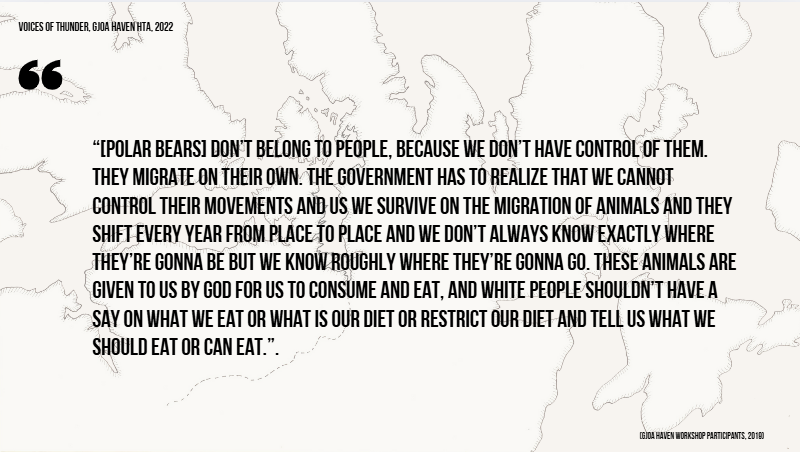Knowledge co-production in BearWatch: Difference between revisions
No edit summary |
No edit summary |
||
| Line 1: | Line 1: | ||
Most of the IQ and TEK that had been collected in the project was part of an informative strategy to determine sampling locations in the field, rather than part of a decisive strategy where Inuit Knowledge is engaged across multiple stages of research decision making. Interviews with elders and hunters had revolved around observations and spatial demarcations under the nominator of Traditional Ecological Knowledge (TEK) marked on maps. | |||
This observation is not to discount the insights, observations, and contributions to research that such TEK can provide for monitoring research. However, as a process of meaningfully engaging with Inuit knowledge on its own terms, beyond a data-driven focus, this narrow focus on TEK falls short. Instead of approaching knowledge conciliation as a question of data, it should be considered as an invitation to rethink the basic assumptions, values, and practices underlying contemporary processes of research and polar bear management. | |||
[[File:Slideshow knowledge is creation.png|border]] | |||
<div class="next_choice"> One of the ways with which the BearWatch research have started to respond to the challenge of knowledge co-production beyond a data-driven agenda, is by exploring the possibilities of “wayfaring”. | |||
'''"Take a Detour to Cut 2"''' if you are curious to find out more about a small pilot study that we have done. | |||
Otherwise, | |||
'''"Return"''' to our testimonial reading.</div> | |||
<span class="detour to-cut-3 link" data-page-title="Another_point_of_beginning_Wayfaring_method" data-section-id="0" data-encounter-type="detour">[[Another point of beginning Wayfaring method|Detour to Cut 3: Different (Knowledge) Conciliation Practices]]</span> | <span class="detour to-cut-3 link" data-page-title="Another_point_of_beginning_Wayfaring_method" data-section-id="0" data-encounter-type="detour">[[Another point of beginning Wayfaring method|Detour to Cut 3: Different (Knowledge) Conciliation Practices]]</span> | ||
<span class="return to-cut-1 link" data-page-title="Multiple Voices" data-section-id="10" data-encounter-type="return">[[Multiple Voices#Relational Accountability|Return to Cut 1: Voices of Thunder]]</span> | <span class="return to-cut-1 link" data-page-title="Multiple Voices" data-section-id="10" data-encounter-type="return">[[Multiple Voices#Relational Accountability|Return to Cut 1: Voices of Thunder]]</span> | ||
Revision as of 19:54, 29 January 2025
Most of the IQ and TEK that had been collected in the project was part of an informative strategy to determine sampling locations in the field, rather than part of a decisive strategy where Inuit Knowledge is engaged across multiple stages of research decision making. Interviews with elders and hunters had revolved around observations and spatial demarcations under the nominator of Traditional Ecological Knowledge (TEK) marked on maps.
This observation is not to discount the insights, observations, and contributions to research that such TEK can provide for monitoring research. However, as a process of meaningfully engaging with Inuit knowledge on its own terms, beyond a data-driven focus, this narrow focus on TEK falls short. Instead of approaching knowledge conciliation as a question of data, it should be considered as an invitation to rethink the basic assumptions, values, and practices underlying contemporary processes of research and polar bear management.

"Take a Detour to Cut 2" if you are curious to find out more about a small pilot study that we have done.
Otherwise,
Detour to Cut 3: Different (Knowledge) Conciliation Practices
